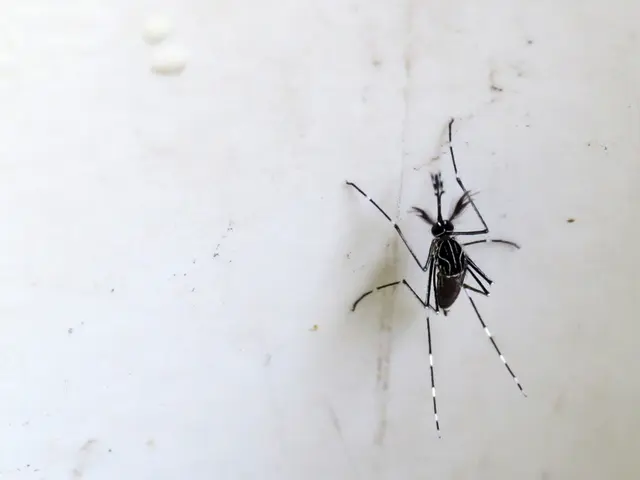Significant Rise in Measles Incidences Forecast in U.S. Over the Next Quarter-Century Due to Potential Slump in Vaccination Rates
Let's Talk Vaccinations: What Happens When We Slack Off
The good ol' US of A could be in for some rough times if we don't step up our vaccination game. A recent study published by JAMA paints a stark picture, suggesting that if we see a drop in vaccination rates, we're looking at tens of millions of measles cases over the next 25 years. Yikes!
With vaccine deniers gaining traction in the highest echelons of our government and an alarmingly large number of people still unaware of the gravity of measles, it's a recipe for disaster.
Researchers from Stanford University developed a simulation model to assess the impact of declining vaccination rates on measles, rubella, poliomyelitis, and diphtheria in the US. Their findings are eye-opening. Consider just one scenario: a 50% drop in vaccination rates would result in 51.2 million measles cases over a 25-year period.
That same drop might also yield 9.9 million cases of rubella, 4.3 million cases of poliomyelitis, and a mere 197 to 200 cases of diphtheria. But don't get too comfortable just yet. If vaccination rates held steady at 2025 levels, we'd still be looking at more than 850,000 cases in the US over the next 25 years.
Taking a hit on MMR immunization rates could push measles infections through the roof. While a 5% rise in vaccinations might only result in 5,800 cases, a 10% dip could mean 11.1 million cases. To achieve herd immunity for measles, we'll need a vaccination rate of roughly 95%. The researchers estimate current vaccination coverage lies between 87.7% and 95.6%.
Statistically speaking, immunization coverage varies across the nation. For instance, New York boasted a childhood vaccination rate of 97.7% for the 2023-24 school year, while Idaho slumped to just 79.6%.
Before the measles vaccine hit the scene in 1963, around 3 million to 4 million Americans fell ill with measles each year, with tens of thousands hospitalized and 400-500 deaths annually. Measles isn't just harmful to humans; it also triggers an immune system reset known as "immune amnesia."
Unfortunately, our nation is currently experiencing its worst measles outbreak in 25 years, with over 800 cases in 25 states and three unfortunate deaths. But it gets worse. Parents of children who died from measles have come forward, stating they have no regrets about their decision to refuse vaccines.
And that brings us to Robert F. Kennedy Jr., the current head of the Department of Health and Human Services. Kennedy's anti-vaccine organization claims vaccines cause autism, and he's been gearing up to reveal the "cause" of autism by the fall. Kennedy's crusade appears to have the backing of the current administration, which doesn't bode well for our MMR vaccination rates in the foreseeable future.
Kennedy and his followers are raking up quite the list of unprecedented health concerns, questioning everything from sperm counts to the presence of rare diseases in a bygone era. The question on everyone's mind is: Are we sliding into an era of hysteria or are there legitimate concerns at play?
Enrichment Data:
- While I've been discussing measles, the same trends apply to rubella, poliomyelitis, and diphtheria.
- The study used six different widely accepted mathematical models, which provided a range of predictions for the projected number of cases.
- Whether vaccination rates stay the same or dip, these diseases will continue to pose a threat to public health, particularly in countries and regions with low vaccination rates.
- The annual number of measles cases in the US has been steadily declining since 1999, but has seen an upswing in recent years, primarily in unvaccinated communities.
- Additionally, the implications of declining vaccination rates are not limited to measles, affecting rubella, poliomyelitis, and diphtheria as well.
- In the study published by JAMA, six different widely accepted mathematical models were used to assess the impact of fluctuating vaccination rates on these diseases.
- Even if vaccination rates remain consistent, these diseases will continue to pose a significant threat to public health, especially in areas with low vaccination coverage.
- Despite the declining trend in measles cases in the US since 1999, there has been a noticeable increase in recent years, mainly in unvaccinated communities.
- With the rise of vaccine deniers in positions of power, and an extensive number of people oblivious to the severity of measles, the future of health, science, and medical-conditions at large may be at risk.
- In the health-and-wellness domain, mental-health issues are also a cause for concern due to the ongoing ignorance about vaccines' importance.
- Ignoring the gravity of the situation could lead to a surge in health-related complications, including cancer, and result in increased hospitalization rates.
- As debates over policy-and-legislation, politics, general-news, crime-and-justice, and war-and-conflicts persist, the impact on vaccination rates and, subsequently, the health of future generations remains a pressing matter.
- Migration patterns could potentially lead to increased transmission of these diseases, making it crucial for countries to maintain reliable vaccination programs and uphold international efforts for global health security.
- The unwillingness of certain individuals to be vaccinated adds to a myriad of concerns about the state of science, technology, and our collective ability to address health-related challenges effectively in the future.








